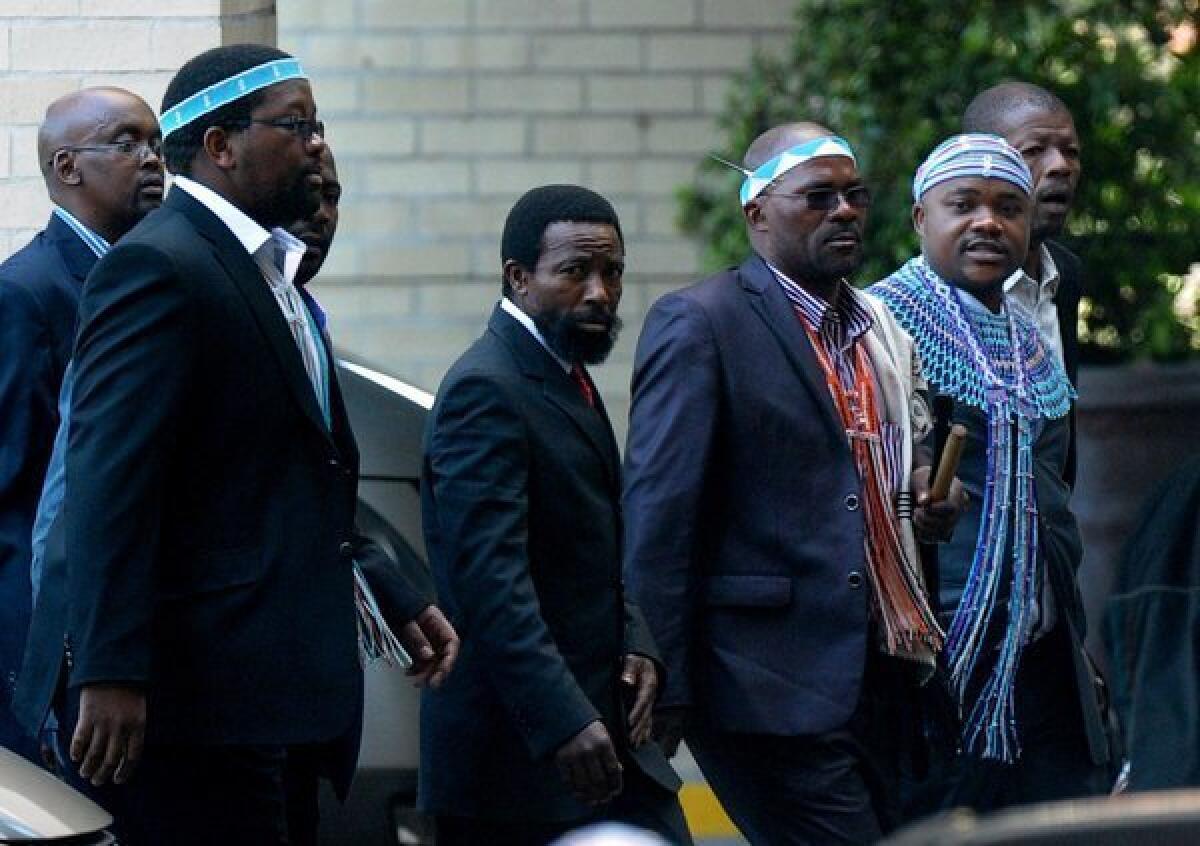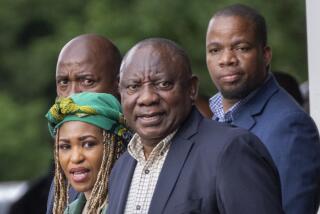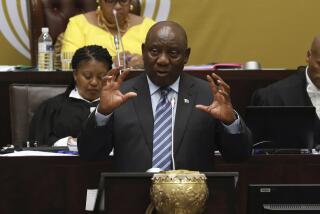Nelson Mandela’s controversial king takes on South Africa’s president

JOHANNESBURG, South Africa -- Nelson Mandela’s king is a colorful figure. Perhaps a little too colorful.
Buyelekhaya Dalindyebo’s greatest claim to fame is that he counts South Africa’s first black president among his subjects.
But the king of Mandela’s AbaThembu clan made local headlines Thursday with a string of invective against South Africa’s current leader, Jacob Zuma, so blunt that members of his own entourage reportedly gasped.
Dalindyebo lashed out at Zuma as he delivered a letter to the president’s Pretoria office Wednesday. The king, who also visited Mandela in the hospital this week, reported that Mandela looked good, had recognized Dalindyebo and had responded with his eyes.
Zuma also stopped by the hospital, and issued a statement saying that Mandela was responding to treatment and remained in critical but stable condition.
Dalindyebo is involved in a very public feud with Zuma, amid reports that the government is in the process of withdrawing its recognition of him as a king for unseemly behavior.
The marijuana-smoking monarch is appealing a 2009 conviction and 15-year jail sentence for assault, kidnapping and culpable homicide. The charges relate to a dispute with some of his subjects dating back to the mid-1990s, when he is accused of kidnapping a woman and her six children, setting their home on fire and beating up four youths, one of whom died.
At a prayer meeting for Mandela last month, Dalindyebo said he would stop smoking dagga, a local term for marijuana, when Zuma stopped being corrupt.
Accusing Zuma of trying to oust him, he delivered a letter Wednesday at the Union Buildings in Pretoria, where the presidency is located, warning Zuma not to interfere in royal affairs. Security officials refused to grant him access to the building.
Dalindyebo was quoted as saying that the president “flushes people like condoms” and announced his intention to leave the governing African National Congress and join the opposition. He went on to accuse Zuma of lying and failing to use condoms, a reference to evidence Zuma provided in a 2006 rape case in which he was acquitted.
The king also apparently breached the ANC’s policy against promoting tribal divisions, describing the president as “just a Zulu boy.”
“I cannot be ordered to come to his office. He must come to my office. I am king unto him and he is just a Zulu boy,” Dalindyebo told reporters.
In a country where opposing the country’s top politician has cost many ANC figures their careers, few doubt that Dalindyebo is on his way out.
The country’s traditional rulers are recognized by the constitution, supported by government funds, allowed to impose fees on local communities and play an important part in the lives of many South Africans.
But Dalindyebo, who at one point announced his kingdom’s secession to avoid jail time, is seen as disreputable among traditional leaders. His brother, Daludumo Mtirara, is on record as refusing to recognize Dalindyebo as king.
“The family are waiting for the government to process the documents confirming that he has been removed,” Mtirara told the South African Press Association on Sunday. “Once the government has done its work, the royal family will sit and identify a suitable candidate to take over as king, as is our custom.”
Dalindyebo last week announced he was ousting Mandela’s grandson Mandla as a clan chief after a family court battle over the location of the graves of Mandela’s three deceased children. Mandla Mandela, who was chosen by his grandfather to be chief, had moved the bodies to his village, Mvezo. He lost the court battle and was ordered last week to send them back to their original resting place in nearby Qunu.
Mandla Mandela accused Dalindyebo of being delusional.
“Whatever thing he is smoking these days has worsened his thinking capabilities,” he was quoted as saying.
ALSO:
Egypt unrest: Suspects held in rooftop killing of Alexandria teen
Global Voices: VW van bio tracks groovy rides to the far reaches
Russian court convicts dead lawyer Magnitsky; case led to adoption ban
More to Read
Sign up for Essential California
The most important California stories and recommendations in your inbox every morning.
You may occasionally receive promotional content from the Los Angeles Times.










